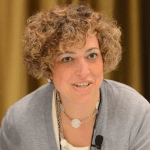

Today in the U.S., there are approximately 3.7 million elementary and secondary school teachers. That is a very large workforce by any standards. As Congress debates the Student Success Act and the overall education overhaul, I cannot help but note that teachers’ voices are woefully absent from the national dialogue on education and from the media.
When journalists seek expert advice on education, they turn to researchers and public figures, not to classroom teachers. The fact is that teachers are the ones who can best anticipate how policies will impact students and offer the most informed opinions and solutions.
As a PR professional who has helped educators nationwide become media spokespeople and advocates, I am only too aware that the reasons for the disconnect between teachers and the press are complex. I also know that the media is a powerful lever that can help shift the poor public perception of teachers, a change that is long overdue.
How can we empower educators to work with the media and increase the frequency with which our best teachers weigh in on education issues that matter? I sat down with Alexandra Fuentes, a biology teacher at Cesar Chavez PCHS for Public Policy in Washington DC, a Knowles Science Teaching Fellow and a veteran of many interviews, including The Washington Post and Bloomberg Radio.
Anya Grottel-Brown: Let’s look at the reasons first. Why are teachers so hesitant to be in front of the media?
Alexandra Fuentes: I hear teachers say all the time that their work is not media worthy. They’ll ask incredulously: “Why would the media be interested in what I’m doing,” when, in fact, they are getting students to make remarkable learning gains. My colleagues have gotten students to apply geometric concepts to music, create their own biofuels and capture a living history of a city through video interviews.
When we are in our classrooms every day, our success stories can seem ordinary to us. Unless teachers speak up, there will always be too few stories that celebrate students’ and teachers’ success.
Grottel-Brown: Are there aspects of the school culture that make teachers particularly reluctant to tell their stories?
Fuentes: A thriving school culture is a place where there is trust, mutual respect and two-way communication. Teachers are reluctant to talk about problems in schools when we think it will strain our relationship with our principal. I see teachers downplaying their expertise in an effort to be seen as trusted team players. And in a female-majority profession, gender norms exacerbate the problem: Teachers are wary of seeking media spotlight when they equate it with bragging and self-promotion.
We have to remove the perceived threat that media attention will damage relationships and redefine it as an avenue through which teachers can advocate for students and for our profession.
Grottel-Brown: What has been your experience with the media?
Fuentes: Every interview I’ve had—from print to TV and radio, from local to national—has been positive. Without exception, reporters were interested in what students and teachers are doing well and how students are connecting their learning to the real world. The public wants to read and hear about successes in education and reporters are willing and ready to go into schools to highlight students and teachers at work.
Grottel-Brown: You and I agree that teachers can and should be in front of the media. What would help teachers get rid of their uneasiness and shift their perspective on media?
Fuentes: Media training and ongoing support will empower teachers to seek out interviews, write Op-eds and speak up for students and for our profession. We need to equip teachers with the tools they need to be able to communicate their ideas clearly. I was able to conquer my fear of talking with reporters once I learned how to enter an interview with a message in mind and to be able to weave that message into my answers to the reporter’s questions.
Grottel-Brown: The importance of media exposure for educators goes beyond classroom success stories. What kind of impact does working with the media have for teachers and students?
Fuentes: We have a professional responsibility to make sure that policymakers have the information they need to set policies that help our students. Every time expert teachers weigh in on critical issues, we not only share ideas for how to improve the learning of students, we also help to define teachers as professionals capable of setting the standards for our profession. When we provide opportunities for students to interact with the media, we send an undeniable message that their voices matter. The memory of that experience will stay with them and can inspire them to continue to work hard and speak up for ideas that can move their communities and this country forward.
Anya Grottel-Brown is executive VP and managing director of Momentum Communications Group. Follow her on Twitter: @AGBMomentum.
